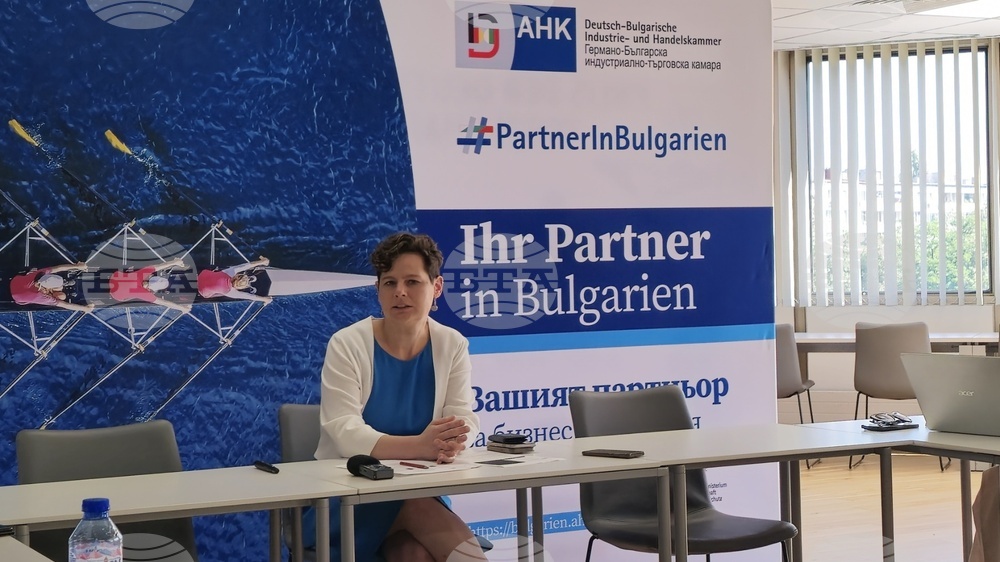site.bta95% of German Companies in Bulgaria Would Invest Here Again - Poll


About 95% of German companies operating in Bulgaria would prefer the country again as a business destination, shows a poll on the business environment in Bulgaria conducted by the German-Bulgarian Chamber of Industry and Commerce (GBCIC). The poll was unveiled at the GBCIC office at the Interpred World Trade Centre in Sofia on Tuesday. The survey was carried out among the 618 member companies of GBCIC between March 4 and 28 as part of a worldwide survey of foreign trade chambers.
GBCIC Chief Executive Sonja Miekley said the above-mentioned high share speaks very well of Bulgaria as an investment destination, although there is room for improvement.
Asked where they would put their money if not here, German businesses in Bulgaria name Romania, Germany, Poland or Switzerland. The poll shows that government incentives are not very important for investment decisions, with only 20% of respondents identifying them as a factor for implementing investment plans.
Despite the large share of German companies which would choose Bulgaria again, the poll indicates decreasing satisfaction with Bulgaria as a place to do business, particularly among small and medium-sized enterprises. In 2025, some 22% of companies assess the situation in their sector as better than in earlier years, compared with 30% in 2024 and 37% in 2023. Approximately 27% of businesses in 2025 describe the situation in their sector as “bad,” compared with 24% in 2024 and 9% in 2023. Another 51% of respondents in 2025 describe it as “satisfactory”, compared with 45% in 2024 and 54% in 2023.
Fifty-one per cent of interviewees do not expect the prospects of the Bulgarian economy to change in 2025, compared with 48% in 2024 and 52% in 2023. One company in three predicts that the prospects will worsen in 2025, compared with 28% in 2024 and 23% in 2023. Nearly 20% of those polled expect better prospects in 2025, compared with 24% in 2024 and 25% in 2023.
Large German companies with more than 1,000 employees each in Bulgaria tend to be more satisfied with the economic situation in this country than smaller entities, Miekley said. She reported that 38% of companies active in the services sector expect the situation to worsen, while 2 companies in 3 operating in trade and manufacturing do not think that the situation will change considerably. Pessimism is observed mainly among medium-sized companies.
It should be noted that the poll was conducted in March, when the new Bulgarian government was very young, having emerged after more than four years of frequent parliamentary elections marking a period of uncertainty for business, Miekley said.
The shortage of skilled labour in Bulgaria remains one of the main challenges to German businesses. About 70% of them say that the shortage of skilled employees pushes labour costs up; 29% say it reduces output value; and 36% note it dampens investment intentions. Skilled labour shortage is the main risk to the Bulgarian operations of 51% of respondents in the poll, and growing labour costs are the greatest risk to 60%. Energy costs are a concern for 33% of companies.
The share of businesses planning to increase their investments in Bulgaria in 2025 has contracted to 37%. The percentage for 2024 was 43%.
Thirty-eight per cent of respondents estimate that labour costs will grow by between 6% and 10% in 2025, and another 24% predict that labour costs will rise by between 11% and 15%. Only 5% say they will rise by between 26% and 30%.
EU membership, relatively low taxes, and a good quality and availability of local suppliers are perceived as some of the principal advantages of Bulgaria as an investment destination, the poll shows. About 85% of entrepreneurs are satisfied or very satisfied with the fact of EU membership, Miekley said, stressing that European integration has a positive impact on Bulgaria as a place for business.
Adverse factors are related to the quality of the public administration, the level of transparency of public procurement, crime and corruption control, and legal security.
Factors with potential to improve are digitization and administration, the conditions for research and development (R&D), employee skills and energy infrastructure. According to Miekley, almost half of German companies in Bulgaria are satisfied with the conditions for R&D, which means that the country is seen as a stable environment in this regard.
About 44% of entrepreneurs interviewed in the poll express dissatisfaction with their employees’ skills. One in three expresses complete satisfaction, Miekley said.
Eighty per cent of GBCIC member companies approve of Bulgaria’s expected accession to the euro area. According to Miekley, the adoption of the euro as the national currency in this country will reduce business costs and will improve Bulgaria’s image as an investment destination. She said that accession will release financial reserves which will flow into the economy, and this will be good for business.
Approximately 60% of polled companies assess positively Bulgaria’s membership of the Schengen free travel zone, and 71% feel positive changes after the accession to Schengen. Positive effects include faster delivery of goods, relaxed travel regulations, higher competitiveness and a better international image of the country. But Schengen also holds risks, respondents say, noting that they have to do with migration, infrastructure and EU external border security.
/RY/
news.modal.header
news.modal.text